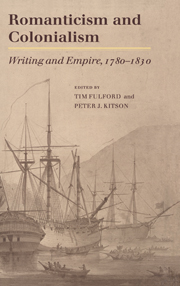Book contents
- Frontmatter
- Contents
- Notes on contributors
- Acknowledgements
- 1 Romanticism and colonialism: texts, contexts, issues
- 2 Romanticism and colonialism: races, places, peoples, 1785–1800
- 3 Romanticism and colonialism: races, places, peoples, 1800–1830
- 4 Accessing India: Orientalism, anti-‘Indianism’ and the rhetoric of Jones and Burke
- 5 ‘Sunshine and Shady Groves’: what Blake's ‘Little Black Boy’ learned from African writers
- 6 Blood Sugar
- 7 ‘Wisely forgetful’: Coleridge and the politics of Pantisocracy
- 8 Darkness visible? Race and representation in Bristol abolitionist poetry, 1770–1810
- 9 Fictional constructions of Liberated Africans: Mary Butt Sherwood
- 10 ‘Wandering through Eblis’; absorption and containment in Romantic exoticism
- 11 The Isle of Devils: The Jamaican journal of M. G. Lewis
- 12 Indian Jugglers: Hazlitt, Romantic Orientalism, and the difference of view
- 13 ‘Some samples of the finest Orientalism’: Byronic Philhellenism and proto-Zionism at the time of the Congress of Vienna
- 14 ‘Once did she hold the gorgeous East in fee…’: Byron's Venice and Oriental Empire
- 15 The plague of imperial desire: Montesquieu, Gibbon, Brougham, and Mary Shelley's The Last Man
- Index
15 - The plague of imperial desire: Montesquieu, Gibbon, Brougham, and Mary Shelley's The Last Man
Published online by Cambridge University Press: 20 August 2009
- Frontmatter
- Contents
- Notes on contributors
- Acknowledgements
- 1 Romanticism and colonialism: texts, contexts, issues
- 2 Romanticism and colonialism: races, places, peoples, 1785–1800
- 3 Romanticism and colonialism: races, places, peoples, 1800–1830
- 4 Accessing India: Orientalism, anti-‘Indianism’ and the rhetoric of Jones and Burke
- 5 ‘Sunshine and Shady Groves’: what Blake's ‘Little Black Boy’ learned from African writers
- 6 Blood Sugar
- 7 ‘Wisely forgetful’: Coleridge and the politics of Pantisocracy
- 8 Darkness visible? Race and representation in Bristol abolitionist poetry, 1770–1810
- 9 Fictional constructions of Liberated Africans: Mary Butt Sherwood
- 10 ‘Wandering through Eblis’; absorption and containment in Romantic exoticism
- 11 The Isle of Devils: The Jamaican journal of M. G. Lewis
- 12 Indian Jugglers: Hazlitt, Romantic Orientalism, and the difference of view
- 13 ‘Some samples of the finest Orientalism’: Byronic Philhellenism and proto-Zionism at the time of the Congress of Vienna
- 14 ‘Once did she hold the gorgeous East in fee…’: Byron's Venice and Oriental Empire
- 15 The plague of imperial desire: Montesquieu, Gibbon, Brougham, and Mary Shelley's The Last Man
- Index
Summary
The Last Man (1824), Mary Shelley's third published and fourth written novel, is impure. Most obviously, this is true of the novel's subject matter: a bubonic-type plague which wipes out the entire human race with the exception of the title character, Lionel Verney. This ‘impurity’ is transgressive (literally, ‘a going beyond or over a limit or boundary’), the result of a fatal and extremely contagious crossing of boundaries. In anthropological terms, it is about ‘dirt’, which Mary Douglas defines as ‘things out of place’; perhaps symptomatic of this contagion, the novel seemed ‘dirty’: The Monthly Review called it ‘The offspring of a diseased imagination, and of a most polluted taste’, while Blackwood's termed it an ‘abortion’. The novel's filth, or to use its own term, its ‘corruption’, operates, as I hope to show, on many levels; and this corruption is not merely thematic or even overdetermined, but is intrinsic to the novel, part of its very ‘conception’.
One of the levels on which corruption is conceived in the novel concerns Lord Byron. The character of Lord Raymond, a Byron figure, experiences passion in ‘strange fits’ as he alternates between his political ambitions, his love for Lionel's sister, and his infatuation with a Greek woman, Evadne. The Shelley circle held Byron responsible for the death of his daughter Allegra in a notoriously unhealthy, Italian convent and for blighting the future of Claire Claremont. Byron abandoned another mistress in order to join the struggle for Greek independence.
- Type
- Chapter
- Information
- Romanticism and ColonialismWriting and Empire, 1780–1830, pp. 261 - 278Publisher: Cambridge University PressPrint publication year: 1998
- 2
- Cited by

